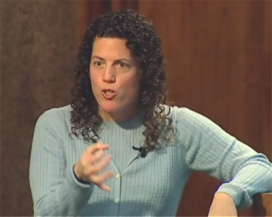Volpe's Dr. Kristin Lewis Speaks on the Pursuit of Alternative Aviation Fuels
The aviation community is taking on ambitious goals for alternative jet fuels, tackling complex scientific, economic, and environmental issues to find sustainable alternatives to petroleum in the near future.
Among these ambitious goals, the Federal Aviation Administration (FAA) aims to achieve carbon neutral growth in the United States starting in 2020 and have one billion gallons of alternative aviation fuel in use by 2018, reported Dr. Kristin C. Lewis, an environmental biologist at Volpe, The National Transportation Systems Center. The global industry has similar aggressive goals, with the International Civil Aviation Organization aiming for carbon-neutral growth starting in 2020 and the International Air Transport Association targeting 10 percent replacement of aviation fuels with alternatives by 2017, said Dr. Lewis.
Winner of the Presidential Early Career Award for Scientists and Engineers for her work on alternative aviation fuels, Dr. Lewis spoke at Volpe on February 28 during "Transportation Trajectories," a dialogue on advancing transportation innovation for the public good.
The pursuit of these lofty aviation goals is fueled by environmental, regulatory, and business reasons—among them the fact that fuel is the single largest expense for airlines, exceeding even labor and benefits, and that fuel prices per gallon have risen by over 250 percent since 2000, said Dr. Lewis.
However, the aviation industry has yet to see widespread use of alternative fuels. "Only in the last six months have we really started to see commercial use of alternative jet fuels," said Dr. Lewis, who is the head research and technical advisor for the FAA's Commercial Aviation Alternative Fuels Initiative (CAAFI).
Unlike surface transportation, aviation requires high energy density fuels, global deployment and compatibility, environmental sustainability, and meeting stringent criteria to deem a product "jet fuel," said Dr. Lewis. In addition, given the existing fleet of commercial planes and their long lives, any feasible alternative jet fuels would need to be compatible with existing infrastructure and equipment.
The Volpe Center and Dr. Lewis are working on key approaches to researching and implementing alternative aviation fuels. Volpe's significant contributions include organizing a federal biofuels working group, leading work to carry out elements of the National Biofuels Action Plan, supporting the Biomass Research and Development Board, working with the U.S. Department of Agriculture on ways to communicate about the barriers to alternative fuels, conducting scenario and feasibility analyses, and building a fuel readiness assessment tool.
"There is no silver bullet," said Dr. Lewis. However, in 15 years, she hopes to see biofuels utilized as a partial solution to the transportation fuels issue or as a bridge to a radically different approach.

Environmental biologist Dr. Kristin Lewis offers an update on the status of alternative aviation fuels. (Volpe photo)
